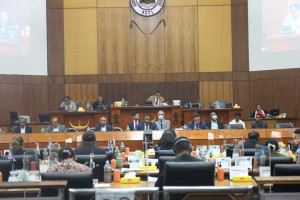National Parliament approves Resolution for the ratification of the Millennium Challenge Compact Agreement

The Minister of the Presidency of the Council of Ministers, Fidelis Manuel Leite Magalhães, accompanied by the Minister of Education, Youth and Sports, Armindo Maia, the Vice-Minister of Finance, António Freitas, the President of Be'e Timor-Leste, E. P. (BTL, E.P.), Carlos Peloi dos Reis and National Executive Director of Compact Development Team Timor-Leste (CDT-TL), Ambassador Constâncio Pinto, participated in the plenary session to discuss and vote on the proposal of Resolution of the National Parliament for the ratification of the Millennium Challenge Compact Agreement.
The proposed Resolution was approved with 40 votes in favour, zero against and ten abstentions.
The cooperation pact was signed on 19 July between Minister Fidelis Magalhães, representing the Government of Timor-Leste and the Vice-President of the American government agency Millennium Challenge Corporation (MCC), Cameron Alford.
During the plenary session, the Minister of the Presidency of the Council of Ministers provided an overview of the main stages of this agreement, from the process of choosing and attributing the compact agreement to Timor-Leste to the reasons for the chosen components to be implemented under this cooperation pact.
The members of the Government and the BTL President answered to the questions and recommendations, at a technical, legal and financial level, presented by the parliamentary committees and the deputies.
This programme, to be implemented over five years and with a total investment of US$484 million, has two main components, for the improvement of two very important areas for the development of Timor-Leste, education and sanitation, water supply and drainage.
The water, sanitation and drainage component aims to reduce the contamination of drinking water and groundwater, which can cause diseases and impede the well-being and health of children and adults. The project includes the construction of a factory to produce chemical disinfectants for the city's water supply, construction of the country's first central wastewater system, improvement of the drainage network for the capital Dili and four neighbouring municipalities, policy and institutional reforms as well as social and behavioural changes to improve the sanitation system and water management at the household level.
The water, sanitation and drainage project, besides its direct impact on the health of our citizens, will also contribute to reducing the risk of flooding, which has affected our country so much in recent years, avoiding its environmental and socio-economic impacts by ensuring sustainable management of water and sanitation.
The education component aims to improve the quality of high school education for students by improving high school education and school leadership across the country. The project will establish the country's first formal initial teacher training certification institution, the Centre of Excellence, which will offer professional training and certification for future and current high school teachers and leaders. Investing in teacher training will lead to better high schools, with students who will be better prepared for jobs or a post-high school education, and thus improve their ability to contribute to the economic growth of the country.










































